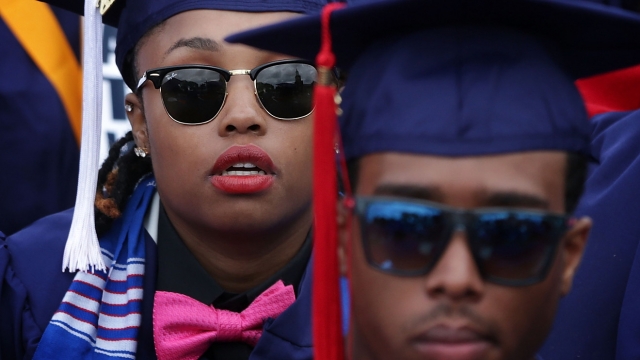
How race affects student debt
http://ift.tt/2gIuHsK
There’s new evidence black student loan borrowers are struggling more to pay down their debts than borrowers of other races.
Twelve years after entering school, the typical African-American student loan borrower owes more than they took out, according to an analysis of recently released federal data published by the Center for American Progress, a left-leaning think tank.
Black borrowers who began school during the 2003-2004 academic year owed 113% of what they originally borrowed 12 years later, CAP found. That’s compared to 65% for white borrowers and 83% for Hispanic or Latino borrowers. That trend continues a pattern from earlier years. African-American borrowers who started school in the 1995-1996 academic year, owed 101% of what they borrowed, compared to 60% for white borrowers and 72% for Hispanic or Latino borrowers.
“We’ve been blind to the interaction between federal student loans and larger racial issues,” said Ben Miller, the senior director of post-secondary education at CAP and the author of the analysis.
The findings add to other research indicating black student loan borrowers have a tougher time paying back their debt. A large share of African Americans default — roughly half of black borrowers who borrowed money for their undergraduate degrees defaulted on a student loan, CAP’s analysis found.
There are also likely larger systemic issues at play here. The gap in wealth between black and white families means that black students are more likely to have to rely on debt to pay for college and, when they do, they tend to borrow more. In addition, black graduates may face discrimination in the job market that can make it more difficult to earn enough money to pay back the debt.
But the higher education system may disadvantage black students and borrowers in other ways too, Miller noted. Policymakers and higher education leaders rarely consider how things like federal policies that lead to students losing government aid, may disproportionately affect black student loan borrowers. Requirements by many schools that certain students participate in preparatory courses — that cost money but often don’t count for credit — may also put black student loan borrowers at a disadvantage when paying down their debt.
African-American students are also more likely to end up in under-resourced schools where it can be it difficult to graduate or earn a degree with value in the labor market.
“If you look at the most affluent public colleges they are much more occupied by white students than African-American and Latino students,” Miller said. “We basically spend less money educating those folks.”
business
via MarketWatch.com – Top Stories http://ift.tt/dPxWU8
